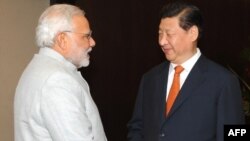The recent meeting between Indian Prime Minister Narendra Modi and Chinese President Xi Jinping on the sidelines of the BRICS summit in Fortaleza, Brazil pointed to promising signs in bilateral relations.
The two countries appeared ready to move beyond border issues to create positive momentum in a more important arena – economic cooperation. But analysts interviewed by VOA suggest future relations between the two neighbors will depend on more than economic bliss.
A key sign of the desire for closer ties coming out of Fortaleza was Xi’s invitation for Modi to attend the Asia-Pacific Economic Cooperation (APEC) meeting in China in November. While membership is voted on by the entire APEC group, Xi's invitation is seen a courting India on a global scale. Xi has already accepted an invitation from Modi to travel to India in September.
Border issue
The border issue, over which China and India fought a brief war in 1962, still erupts in occassional border skirmishes, and is still an important issue to resolve -- especially for India. At the Fortaleza meeting, Modi said negotiating an agreement on their border differences would set an example for the world on conflict resolution.
Xi, however, was more intent on sending another message.
“China and India are long-lasting strategic and cooperative partners, rather than rivals,” Xi said, according to Xinhua. As the two largest nations in the world, he argued China and India could have more influence combined than they currently have separately.
“If the two countries speak in one voice, the whole world will attentively listen,” the Chinese leader was quoted.
Financial cooperation
With the United States standing as the protector of much of East Asia in China’s disputes in the South China Sea, having India as a partner would give China some balance. In terms of specifics, however, the focus remains largely on economic cooperation.
“The Chinese government [has] openly said that the China-India relationship in the 21st century would be the most vibrant, the relationship with the biggest potential,” said Haiyan Wang, managing partner of the China India Institute.
China overtook the United States to become India’s largest trading partner this year, according to a study by the PHD Chamber of Commerce, an Indian trade group in New Delhi.
“The China dream and the India dream are essentially in some way a common dream, to become richer, more prosperous,” said Wang. “[The] common pursuit of a common dream requires a peaceful coexistence and becoming a lot more pragmatic in finding ways to cooperate rather than just focus on the rivalry.”
If the issue is economics, then one obstacle frequently cited by analysts is the perception that India’s trade deficit with China is too high.
However, Anil Gupta, professor at the Smith School of Business at the University of Maryland, believes this isn’t the case.
“It’s not high because ultimately you cannot expect trade to be balanced with every country,” said Gupta.
India’s trade deficit with China was $31 billion in 2013, which constituted only 20 percent of India’s total trade deficit.
“If India is concerned about its trade deficit, which it must be, the problem isn’t China,” Gupta said.
While the Indian government would like to see an increase in Chinese investments, some analysts argue that that China should look toward the Association of Southeast Asian Nations (ASEAN), for trade and investment opportunities as opposed to the Indian market.
Forging trust
But Girija Pande, of Apex Avalon Consulting, a consulting firm that looks at business in Asia Pacific markets, believes that India’s market is more attractive because of its size compared to ASEAN markets.
“They [China] thought they would go into Vietnam or Thailand or Indonesia or many of the ASEAN countries. Now all of them are smaller markets and they are also export markets so they don’t have a home market which is large enough,” Pande said.
Wang, from the China India Institute, believes that the more fundamental issue of trust and knowledge deficit between China and India must be overcome in order for economic relations to grow.
Kerry Brown, a Professor of Chinese Politics at the University of Sydney, agrees. Writing recently in The Diplomat, Brown said the solution to better relations requires more than just increasing trade.
“They often act like they don’t really understand the relevance they have for each other beyond narrow border issues, nor do they speak a common geopolitical language,” said Brown. “For two countries that pride themselves on being ancient civilizations … these days China and India look like fumbling, nervous youngsters meeting on a first date.”
The interesting question, according to Brown, is how the world is going to respond to their warming relationship – and whether it’s going to last.




